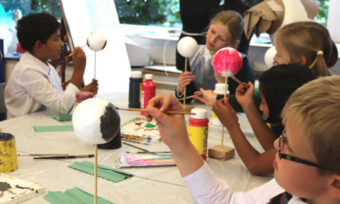[vc_row][vc_column][vc_column_text css=”.vc_custom_1550678833457{margin-bottom: 0px !important;}”]
The original article is available here.
‘Pupils at an independent day school in Scotland have stars in their eyes – thanks to an Erasmus+ project spanning the breadth of Europe.
Wellington School, in Ayr, already had a strong international pedigree, having won the British Council International Schools Award more than once, so it was natural to turn to its European peers for an initiative that would reach for the skies, quite literally.
The Eurostronomia project sees Wellington collaborating with seven schools that stretch from the westernmost parts of the European Union to the easternmost, encompassing eight languages, cultures and educational systems, with partners from Germany, France, Slovenia, Romania, Bulgaria, Portugal and the Former Yugoslav Republic of Macedonia.
Shaping our world
“Having Europe come into our schools is very important,” said Susan Coontz, Principal Teacher of Modern Languages and International Co-ordinator. “During past projects, parents have commented on how much they and their children have learned and benefitted.
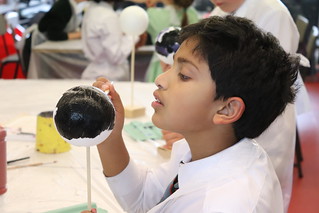
“We also want to improve the knowledge, understanding and application of key skills, linking many academic areas with science at its core, inciting pupils’ curiosity about the universe and encouraging them to learn how to separate fact from fiction.
“As Astronomy is becoming an increasingly important part of school curricula across Europe, this Erasmus+ project is also helping to build capacity in all the partner schools through enabling us to share best practice.
Erasmus+ is opening doors to the next stage of pupils’ lives, be it in work or in higher education
“Whether it is our 30 years of experience of organising international projects and exchanges or our Slovenian partner’s proficiency in working with gifted science students, each partner school brings an added dimension to collaborative work which enriches the curriculum and enhances the learning experience for all our pupils.”
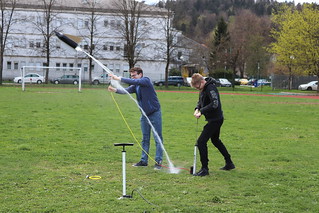
Andrew McPhee, Principal Teacher of Physics and Science, explained how activities have been specifically tailored to all levels of mathematical, physics and scientific ability and for a wide range of student ages.
“It is helping us to develop pupils’ skills, knowledge and competencies in science and maths, using astronomy to develop observational, research and data-handling skills,” he said. “We are exposing our pupils to a style of experimental teaching and learning that some have never previously experienced.
“Pupils are also developing skills in IT, film and video, language and literacy, report writing and presenting, and are developing their self-confidence in the process. They are discovering different approaches to problem-solving and are experiencing new cultures, religions and languages. Erasmus+ is opening doors to the next stage of their lives, be it in work or in higher education.”
Teachers also benefit from Wellington being involved in projects like Eurostronomia.
“Collaboration with staff from other countries is an invaluable form of in-service training,” said Susan. “Teachers are able to observe how their subject is taught in other countries and can see different methods of classroom and student management, impacting on their own practice when they return home. The interdisciplinary nature of the project encourages them to embed the activities into their everyday teaching.”
Total inclusion
Secondary pupils at Wellington, which caters for children from 3 to 18 years old, have been involved in the mathematical and astrophysics elements of the project, designed to stretch the most able and to help them to work in multi-national, multi-lingual teams. The project partners have also chosen to co-fund the project, to allow as many pupils as possible to travel abroad.
“As our pupils come from a very broad range of backgrounds, the project has to be suitable for all,” Susan explained. “Softer activities are carried out by less scientific pupils and pupils with additional support needs. Experience has shown us that inclusion in interdisciplinary projects is to the benefit of all.
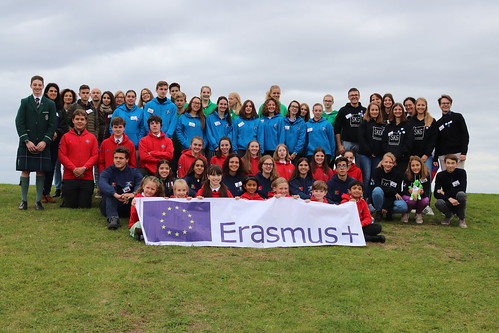
“Previous experience has shown that the participant base is wider on a funded activity like this than on a school trip, for example, where the costs to families can be high.
“Through the contact with young people from other countries, pupils become more open to others and more confident in their own capabilities. The school’s results also improve as a consequence.”
The funding has also helped the schools to buy specialist equipment, to invite high quality speakers into the schools and to fund visits to universities, research centres, museums and galleries.
To boldly go
The project supports the short-term exchange of groups of pupils with partner countries. During visits, they are able to take part in a range of workshops and exciting activities, from building star wheels to understanding tides by surfing them; from designing games to addressing topics like the evolution of the universe and the interconnections between astronomy and music.
“The various activities and mobilities provide our pupils with opportunities to work together on high-quality tasks which will not only improve their scientific knowledge, but also their team-working skills, their communication competence and also allows them to have fun,” said Susan.
“The exposure that pupils have to different lifestyles while on mobilities is also an important part of their development. They learn that ‘different’ is not necessarily better or worse. For those who don’t travel, hosting visitors from other countries opens doors. They make friends and learn from the customs and cultures that are brought into our schools and homes.
Often the contact with other young Europeans is the longest lasting and most impactful consequence of Erasmus+, and it can be life-changing
“Science is a collaborative activity with the sharing of ideas leading to new discoveries. By working together, our learners experience working in multicultural, multinational and multilingual environment at an early age. The project brings together young people from a range of socio-economic groups, including migrants, and this diversity brings added value.
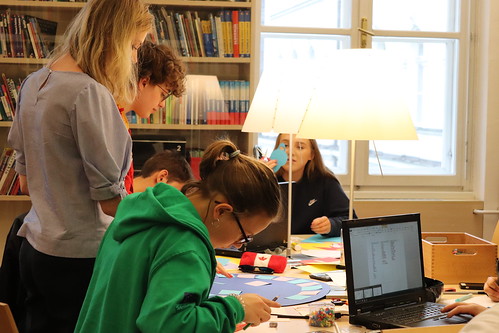
“Often the contact with other young Europeans is the longest lasting and most impactful consequence of Erasmus+, and it can be life-changing.”
Wellington pupils seem to agree that Eurostronomia has been great.
“Erasmus+ was a very eye-opening experience, seeing people from many different countries coming together as good friends rather than strangers,” said Brinda Kandimalla. “I participated in the Mars Rover activity and it was really fun.”
Holly Bradfield said: “I made lots of friends from different countries during the week. It is really amazing to be able to make friends with people from different cultures and backgrounds.”
Pupils and staff are very much looking forward to visits to Macedonia and Portugal in 2019 and to Germany in 2020. Who knows where else these intergalactic pupils will travel in the future, thanks to Erasmus+!'[/vc_column_text][/vc_column][/vc_row]
